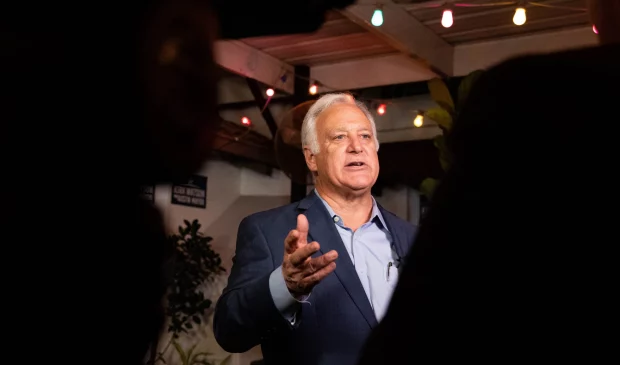By a razor-thin margin, Austin voters chose Kirk Watson as the city’s next mayor, electing him to navigate soaring housing costs and contentious fights playing out over how to build for the city’s growing population.
Watson squeaked out a win with just 886 more votes than his opponent, state Rep. Celia Israel, in a runoff election Tuesday. Watson replaces outgoing mayor Steve Adler, who has held the position since 2015.
“Thank you to the voters for the confidence they’ve placed in me,” he said at an election night party at Santa Rita Cantina in Central Austin. “This is the third time I’ve been elected mayor of Austin.”
Watson served as mayor of the city from 1997 to 2001. He left his second term early to run for attorney general, losing the contest to now-Gov. Greg Abbott.
Tuesday’s race was tight. Israel beat out Watson by just 17 votes among Travis County voters, which represent the vast majority of Austin. But in Williamson and Hays counties, where just a fraction of Austinites live, voters went overwhelmingly for Watson, ultimately helping him clinch the race. He won by the smallest margin in an Austin mayoral race since at least the late 1960s, according to election records.
Israel conceded the race, and campaign staff said she would not seek a recount.
Throughout her campaign, Israel seemed to galvanize a younger, more diverse crowd. If elected, she would have been the city’s first Latina and openly gay mayor.
She was the top vote-getter in the November general election, beating Watson by 15,000 votes. But because no one in the field of six candidates got 50% of the vote, the city was required by state law to hold a runoff.
Runoffs are plagued by low voter turnout, and this one was no different: Roughly 18% of registered voters in Travis County participated. And not enough came out for Israel.
“We came up just a little short,” she said at an election party at a restaurant in Northwest Austin. “My campaign was founded on a very simple idea: the people who built this city and who continue to build this city, who dress our wounds, who teach our kids and drive our buses, answer our 911 calls … they deserve the respect and the compassion that a progressive city can give them.”
Looking at a map of election results, the divide across the city is stark: Israel easily carried neighborhoods east of I-35, where the city is lower-income and more racially diverse. She also carried more central parts of town, such as Hyde Park and Crestview.
Watson, on the other hand, won in the city’s wealthiest neighborhoods, precincts west and directly east of MoPac, such as Tarrytown and Old West Austin.
As he prepares to take office on Jan. 6, Watson confronts a city trying to manage significant growth, where housing prices and rents have risen by 30% in the past couple years.
Both Watson and Israel campaigned on promises to tackle the city’s growing unaffordability. While they both acknowledged the city needs to build housing to meet the demand for it, Watson advocated for a more moderate approach, saying he would take into consideration concerns about neighborhood change. Israel has said that approach would allow neighborhoods with more political power to opt out of building much-needed housing.
Ultimately, voters went with the man who’s done the job before. Watson pitched himself as a candidate with the experience and political know-how to move quickly on alleviating the city’s growing unaffordability.
Because Austin mayors do not have veto power, this person is often a consensus-builder, governing with a diplomatic rather than strong hand.
“I’m eager to start working with my colleagues on the Austin City Council,” Watson said Tuesday night. “That is part of the fun, I think, of being part of the City Council, is being able to build relationships with those colleagues.”
Watson said one of the first things he will do as mayor-elect is convene a committee to look into making child care in the city cheaper and more accessible. He said that while housing consumes most of a family’s budget, child care is often a close second.
“I want Austin, Texas, to be the best city to raise a child,” he said.
Watson will serve two years instead of the typical four-year term. In 2021, voters supported a proposition intended to increase turnout in mayoral elections by moving them to the same year as presidential races. Austinites will choose a mayor again in 2024.








